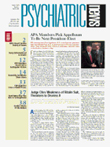The popular media have had a field day the last few years describing the alleged abuse psychiatric patients undergo when they are secluded or restrained. Some of the accounts have shocked the public enough that psychiatrists and mental health professionals now face a barrage of new rules on the subject written by lawmakers and federal regulators.
Thus a two-part symposium on this topic at APA’s annual meeting in New Orleans in May is coming at a particularly opportune time. Titled “The Use of Force in Psychiatry: When Is It Helpful and When Is It Not?,” the sessions are being organized by the American Association of Community Psychiatrists. They will take place Tuesday, May 8, and Wednesday, May 9, from 2 p.m. to 5 p.m.
Experts on various aspects of the seclusion and restraint issue will offer their observations and guidance on when, if at all, it is appropriate for psychiatrists to turn to these measures. Nicholas Meyers, J.D., deputy director for congressional relations in APA’s Division of Government Relations, will focus in particular on the status of legislation and proposed federal rules concerning seclusion and restraint, as well as on steps accrediting organizations have taken in this area and the response of psychiatric organizations to the various proposals.
Cornelia Beck, Ph.D., will discuss the use of force with older psychiatric patients, including those who live in residential care and nursing facilities. She will offer recommendations for intervening with agitated or disruptive elderly patients.
Randolph Dupont, Ph.D., will concentrate on “best practice” models for the use of seclusion and restraint for mentally ill persons in police custody or correctional settings.
Frank Bergman will describe the issue from the viewpoint of a mental health care patient who has experienced seclusion and restraint, while Richard O’Dea, R.N., will explore concerns from the perspective of the staff who carry out seclusion and restraint orders. O’Dea will discuss how staff training and limited resources affect how and when seclusion and restraint are used.
During the Wednesday portion of the symposium, Wanda Mohr, Ph.D., will turn a spotlight on the sensitive issue of when these interventions should be used with child and adolescent patients. She will refute some of the assumptions that professionals use to justify using these measures in a young population.
Andrea Eberle, M.D., a member of the Board of Directors of the National Alliance for the Mentally Ill, will explain the family’s perspective on the use of seclusion and restraint, while psychiatrist Charles Huffine, M.D., will provide the clinician’s view on the use of these interventions with children and adolescents. He will explicate the often-differing views of the subject by clinicians and “advocates.”
Debbie Carter, M.D., will examine how the issue is viewed and used in juvenile justice facilities, and Ruth Ryan, M.D., will look at important concerns in using seclusion and restraint with developmentally disabled individuals.
Andres Plumariega, M.D., will tackle the use of pharmacological or chemical restraint methods in clinical settings, with particular attention to their application for children and adolescents.
David Pollack, M.D., an associate professor in the psychiatry department of Oregon Health Sciences University, will chair both parts of the symposium.
The location will be published in the program book distributed on site at registration. ▪
